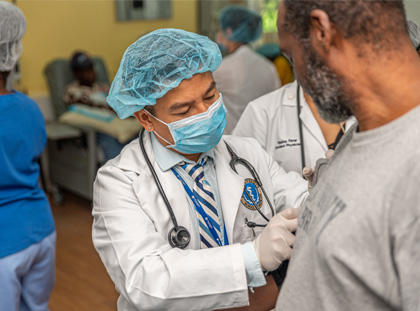The United States Centers for Disease Control and Prevention (CDC) Global Health Center says, “A disease threat anywhere is a disease threat everywhere.” This statement may best illustrate the concept of global health, which focuses on the health needs of people around the world. Contagious disease threats may rise in one population, but the mobility of that population can quickly spread that disease locally, creating an epidemic, and then globally, creating a pandemic. Reference the development of the devastating COVID-19 pandemic.
Global health is about much more than communicable and contagious diseases, however. Global health issues also include economic and political instability, income and social inequality, lack of education and employment, insufficient food and medicine, climate change and natural disasters, limited access to quality health care, and more. Global health is truly an all-encompassing concept, one that takes specific training to better understand its many cultural, economic, environmental, and social factors.
Global Health Training
Many accredited medical schools—including Ross University School of Medicine (Ross Med)—address global health issues in their medical sciences and clinical training. Many medical residencies, too, cover global health in their postgraduate training, and many universities offer master’s and doctoral degrees in global health. The topic is so well covered because the field is so wide ranging, and because it offers numerous opportunities for physicians and other professionals wishing to expand their personal and technical expertise—and perhaps their career horizons, as well.
Global Health Agencies and Organizations
As the COVID-19 pandemic and other global health issues so clearly demonstrate, a global health care perspective can be of critical importance. Our global society is so interconnected that seldom are health issues truly localized. Numerous agencies and nongovernmental organizations provide funding, resources, and tools to promote education and research in global health, and many take direct action to help populations in crisis. Among the most prominent are the aforementioned CDC as well as the Global Health Council, United Nations Foundation, U.S. National Institutes of Health (NIH), World Bank, World Health Organization (WHO), and Doctors Without Borders. There are also many groups with more targeted global health aims, including:
Global Health Issues
Global health issues are as many and varied as the people, cultures, and geographies that make up our planet. At Ross Med, students learn how global health issues are interconnected but also unique to each medical system, environment, and patient population. At the CDC Global Health Center, the main global health issues are categorized as:
The WHO and World Bank add several other pressing global health challenges, including:
- Climate change: Guarding the social and environmental determinants of health (clean air, safe drinking water, sufficient food, and secure shelter)
- Humanitarian crises: Serving the most vulnerable populations during a crisis
- Long COVID: Diagnosing and treating post COVID-19 conditions
- Mental health: Promoting, protecting, and restoring mental health for individuals, specific groups, and entire populations
- Noncommunicable disease (NCD): Fighting cancer, cardiovascular disease, and other NCDs and reducing key risk factors
- Poverty: Fighting extreme poverty and promoting shared prosperity
- Universal health coverage: Providing quality, affordable health services for everyone
Remember that these are just a few of the many global health issues affecting populations throughout the world, and that many more global health organizations—as well as numerous smaller groups and individuals—are out there doing all they can to help. For more in-depth information on global health, see Global Health at the NIH as well as its related careers, e-learning resources, research topics, and studies.
The Future of Global Health
Global health issues will only grow more important and varied in coming years as new challenges arise and countries and economies around the world become ever more interconnected. Growing wealth and trade have the potential to make important global health improvements, but many problems remain to be solved and new threats are constantly emerging. To truly improve global health, doctors and scientists—as well as private individuals and organizations—must work together and coordinate on a global scale while also innovating and creating new local strategies and treatments.
If global health issues are important to you and you want to take an active role in the wellness of people, a career in medicine may be the right path for you. Learn more about Ross Med and all it has to offer. Check out the MD program, review the admission requirements, and if you’re ready to start your journey toward a rewarding career as a physician, apply to Ross Med today!
Related resources:




